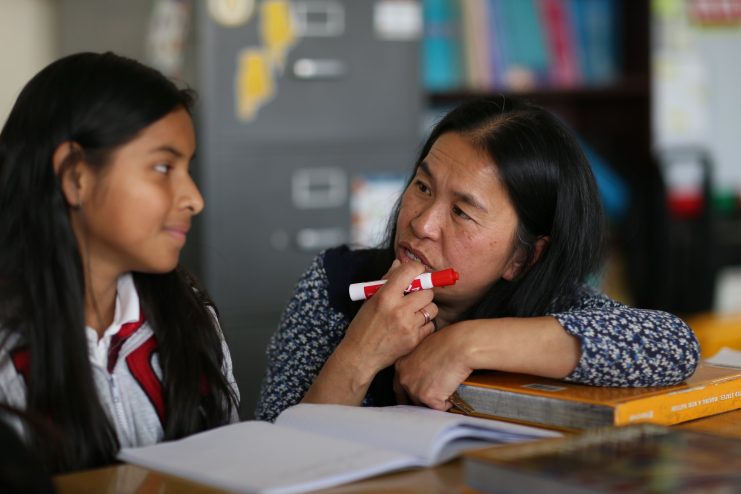
Co-Learning with Students to Improve Instructional Practice
“The teacher is no longer merely the-one-who-teaches, but one who is him/herself taught in dialogue with the students, who in turn while being taught also teach. They become jointly responsible for a process in which all grow.” ― Paulo Freire
As lifelong learners, teachers consistently seek opportunities to improve their teaching practice. However, they are often not given the agency to grow in collaboration with colleagues and in partnership with students during job-embedded professional development on site. Research shows, however, that if professional development or content-specific meetings were based on the compelling questions teachers ask themselves, instead of mandated by the district or school, there would be more engagement and growth among teachers.
But what does giving teachers agency to drive their learning look like? The best professional development can happen right in the teachers’ classroom, inspired by their own students through partnering with their students.
At Lead by Learning, we lead with our core value “place students at the center” during our inquiry-based professional learning sessions with partners. The inquiry process encourages teachers to be curious about their students not only as learners but as human beings.
We also know that teachers work with many students, especially those who work in upper grades, and can feel overwhelmed with the idea of collecting student data. That is why, we support our partners to work deeply with focal students to get a more in-depth understanding of their learning and thinking to impact their instructional choices.
A powerful tool that is used to lift up students’ voices is our Focal Student Learning Partner Conversation Tool, which creates the space for teachers to have authentic conversations with their students based on what they want to understand better to improve their students’ experience and academic outcomes. Even engaging in a few simple questions with students can provide a large amount of data that wouldn’t otherwise be made visible. Some prompts include:
- Tell me about a time when…?
- What usually happens for you when/during ________?
- What do you need to feel successful in…?
Marta Soto, a participant in our Oakland Unified School District district-wide communities of practice with the Social Emotional Learning department and English Language Learner Multilingual Achievement department reflected on the importance of being in collaborative conversations with her focal students when it comes to their writing process in her blog, Bringing Self-Awareness into Writing.
‘The next day I went to class and decided to ask my focal students, “How do you feel about writing?”
Two out of my three students said that they were not good writers because of their handwriting. To my students how good or “bad” your handwriting was represented by how good or “bad” your writing was.
This was not an answer I was expecting to hear and it really made me reflect on the way that I have been teaching writing this year. My students were so focused on how their writing looked that they were not able to focus on the content. My first step was to incorporate Socio-Emotional Learning (SEL). I needed to change their perception of the writing I wanted them to do in class and build their self-awareness of what a writer is.’
The students’ responses provided Marta with powerful insights into the importance of supporting her students with their social-emotional needs before and alongside supporting their academic skills. In a simple conversation, Marta learned from her students that she needed to build their confidence as writers, and then help them develop their writing skills.
By centering her professional learning on her own curiosity and questions, her readiness to improve her practice was amplified because of the implicit agency she held in the learning process.
Consistent self-reflection on one’s teaching practice alongside student data, like a Focal Student Learning Partnership Conversation, is beneficial to adult and student learning and is an ongoing process and learning journey. As Paulo Freire stated, “Knowledge emerges only through invention and re-invention,” the inquiry journey doesn’t end at the closing of the school year or just one Learning Partnership Conversation, it is only the beginning of the learning partnership. Teachers are equipped with the tools and mindsets to always learn from their students, and consistently collect valuable data, so they can invent and reinvent the best teaching strategies and practices that meet student needs.
Get started with Focal Student Learning Partnership Conversations today and download our Step into Practice tools.
